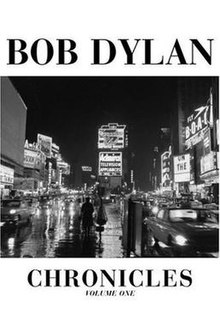Chronicles, Vol. 1

Hardcover jacket
|
|
| Author | Bob Dylan |
|---|---|
| Country | United States |
| Language | English |
| Subject | Bob Dylan |
| Genre | Autobiography Music |
| Publisher | Simon & Schuster |
|
Publication date
|
October 5, 2004 |
| Media type | Print (hardback & paperback) |
| Pages | 304 pp (first edition, hardcover) |
| ISBN | (first edition, hardcover) |
| OCLC | 56634799 |
| 782.42164/092 B 22 | |
| LC Class | ML420.D98 A3 2004 |
Chronicles, Volume One is a memoir written by American musician Bob Dylan. The book was published on October 5, 2004, by Simon & Schuster.
The 304-page book covers three selected points from Dylan's long career: 1961, 1970, and 1989, while he was writing and recording Bob Dylan, New Morning and Oh Mercy, respectively. Chronicles is allegedly the first part of a planned 3-volume collection.
The book spent 19 weeks on the New York Times best-seller list for hardcover nonfiction books.Chronicles, Volume One was one of five finalists for the National Book Critics Circle Award in the Biography/Autobiography category for the 2004 publishing year.
Chronicles began as Dylan's attempt at writing liner notes for reissues of Bob Dylan, New Morning and Oh Mercy, but expanded into a larger project: "I got completely carried away in the process of... I guess call it, 'novelistic writing." Dylan claimed to work without an editor or collaborator while creating the book.
Defying expectations, Dylan wrote three chapters about the year between his arrival in New York City in 1961 and recording his first album, focusing on a brief period of relative obscurity, while virtually ignoring the mid-1960s when his fame was at its height.
He also devoted chapters to two lesser-known albums, New Morning (1970) and Oh Mercy (1989), which contained insights into his collaborations with poet Archibald MacLeish and producer Daniel Lanois. In the New Morning chapter, Dylan expresses distaste for the "spokesman of a generation" label bestowed upon him, and evinces disgust with his more fanatical followers.
At the end of the book, Dylan describes with great passion the moment when he listened to the Brecht/Weill song "Pirate Jenny", and the moment when he first heard Robert Johnson's recordings. In these passages, Dylan suggested that the process ignited his own songwriting.
...
Wikipedia
